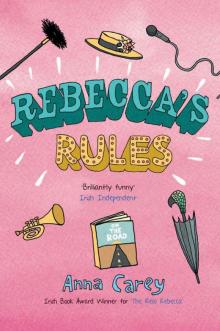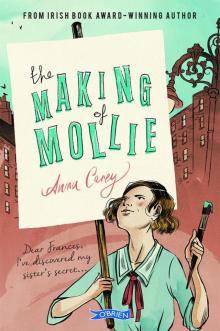- Home
- Anna Carey
The Boldness of Betty Page 3
The Boldness of Betty Read online
Page 3
There was a slightly awkward moment and then Mrs Lawlor said, ‘Goodness, what am I doing, making you stand after you’ve walked here with those heavy bags? Sit down, please, do.’
And so we sat down on Mrs Lawlor’s drawing-room sofa, while she sat in one of the armchairs. I wished I could roll back on the cushions but of course I couldn’t. Ma was barely sitting on the sofa at all; she just perched on the very edge.
‘And are you going to school, Betty?’ Mrs Lawlor asked politely.
‘Yes, Mrs Lawlor,’ I said. ‘Until the end of the summer term. I’ll be leaving then.’
Mrs Lawlor smiled. ‘I’m sure you’ll be glad to leave. Lavinia’s got a whole year of school left – we told her she had to stay and do her Intermediate Certificate but she’d rather be off playing tennis.’
And without thinking I said, ‘Well, I don’t want to leave. I wish I could do the Intermediate Certificate.’
As soon as I said it, I worried it sounded as if I was suggesting that Lavinia was ungrateful, which was of course exactly what I was thinking. Ma gave me one of her looks, a look that said I’d better remember where I was, and that I’d better not even think of telling Mrs Lawlor exactly what I thought about girls who didn’t appreciate getting to go to school, and who thought leaving it meant playing tennis instead of having to go out and get a job. My Ma can say a lot with a look.
I wished I hadn’t said anything, but actually Mrs Lawlor didn’t seem particularly bothered by what I’d said. In fact, she laughed as if I’d made a joke.
‘Do you really?’ she said. ‘Well, I wish my daughter had your academic enthusiasm.’ The doorbell rang. ‘That should be her now.’
She didn’t get up to answer the door, and I realised that of course Jessie or maybe another maid would be answering it for her, even though all the servants must have been upstairs or down in the kitchen and we were in the room right next to the front door.
A moment later I heard the door open and a girl about the same size as me with shiny golden-brown hair came into the drawing room, yawning.
‘There you are, Lavinia,’ said Mrs Lawlor. ‘Mrs Rafferty and her daughter are here with your birthday clothes.’
‘Do we have to do this now, Mother?’ Lavinia’s voice was petulant. (That’s another good word, isn’t it? It means sulky, more or less.) ‘I’m awfully tired.’
‘Of course we do.’ Mrs Lawlor’s voice became stern. ‘They’ve come all this way to do a fitting. If you want to have new frocks to wear for your party next week, you’ve got to make sure they fit.’
Lavinia sighed, as if she were being forced to undergo some terrible trial.
‘Oh all right then,’ she said. ‘I’ll get ready.’ And she walked out of the room.
Mrs Lawlor’s smile was almost apologetic.
‘We’d better do this up in her bedroom,’ she said, rising from her armchair. Ma stood up too. I wasn’t sure if I should go with them – after all, I’d just been brought along to carry the clothes, not fit them. But Ma gave me another one of her meaningful looks so I got up and followed them up to Lavinia’s bedroom, where she had already taken her frock off and was standing there in the nicest undergarments I’ve ever seen, in what must have been the most beautiful bedroom in the world.
Of course, I know from books that there are girls who have rooms like this, but knowing something from books is very different from actually seeing it with your own two eyes. The walls were papered in pale blue with little rosebuds, and there was a silk eiderdown on the bed in the same colours. The bed itself was a high wooden affair, painted white with a little bouquet of flowers on the headboard. I thought of my bockety brass bed, with the knob that falls off if you drop onto the bed too hard, and for the first time having that bed all to myself didn’t seem so amazingly wonderful.
All the bits of furniture – the dressing table with the hinged mirror over it, the wardrobe and even the bookshelf – were white and decorated with little painted bouquets of flowers. I looked longingly at the bookshelf, which just had a couple of books on it; the rest of the shelves were occupied by little glass ornaments. There was a picture of the Blessed Virgin above the bed and lots of lovely prints in golden frames of girls frolicking in a garden with dogs. And there was a fire lit, in the bedroom, in the middle of the afternoon. I couldn’t help it. I gawped. And Lavinia noticed. I could see her looking over at me with a sort of amused look on her face, and I quickly looked down at my boots, which looked clumpier and scruffier than ever.
‘Right then, Miss Lavinia,’ said Ma briskly, taking her tape measure and pins out of her bag, and I remembered that she was used to dealing with people like this, both as a dressmaker and also from her days in the shop. Once she was at work she no longer looked awkward or uncomfortable, though I’m fairly sure I did, standing behind her like a big eejit with nothing to do. I wished I could have just gone down to the kitchen to Jessie and had a cup of tea. Ma handed Lavinia a frock and the girl pulled it over her head and did up the buttons. Ma helped do the hooks at the back and then stood back. She looked critically at her creation and then looked at Mrs Lawlor.
‘What do you think of the length there, Mrs Lawlor? A smidgen too long, do you think?’
‘I think you might be right, Mrs Rafferty,’ said Mrs Lawlor. ‘Maybe you could pin it up half an inch, just to see.’
‘Right you are,’ said Ma. She turned to me. ‘The pins please, Betty.’
And that’s what we did for what felt like the next five years (though I suppose it was only about three quarters of an hour really). Lavinia tried on frocks, Ma and Mrs Lawlor stared at her, and every so often I handed Ma pins so she could adjust the fit. Sometimes I held the hem or pinched the waistline so she could pin it in place, but that was about it. There weren’t even that many adjustments to make, but every single thing had to be tried on and examined by Ma and Mrs Lawlor, and of course Lavinia had plenty of things to say too. In fact, she kept on talking and talking in her drawling, discontented voice. She spent the entire time we were there whining to her mother about the special cake she wanted for her birthday party the following week, and how dreadfully dull school was, and how awful the teachers were because they actually try to make her read books when she’d rather be out on the tennis court.
She went on and on and on, and of course I didn’t say anything in response because she didn’t care what me or Ma thought. As far as she was concerned we were just things, moving around her, doing what we had been built to do. The only vaguely interesting part of her monologue (that’s another word I’ve learned from reading, it’s when someone talks on their own for ages) was when she told us some of the girls at school had started wearing little Votes for Irish Women buttons on their blouses.
Not that I care too much about votes for women. After all, my da can’t vote either because he doesn’t own property, and the rent on our house isn’t high enough to put him on the voting register. But still, Lavinia talking about suffragettes was more interesting than listening to her go on about her birthday tea or how she was going to make her brother take her out to some tennis tournament in Howth during the summer holidays.
Eventually, however, the last frock had been tried on and Lavinia changed back into her day dress while Ma and I packed the new frocks back in their paper wrappings to take home.
‘I’ll have them back to you by Saturday,’ Ma said to Mrs Lawlor as we walked back onto the landing (which was bigger than my bedroom), leaving Lavinia to the privacy of her beautiful boudoir.
‘Thank you so much, Mrs Rafferty,’ said Mrs Lawlor. She smiled at me. ‘And thank you, Betty. You’ve been a very able assistant.’
‘Thank you, Mrs Lawlor,’ I said, even though I hadn’t done much besides hand Ma a few pins and hold up Lavinia’s hems. And it wasn’t as if I was being paid for it.
‘Well,’ said Ma, after Jessie had given us a cup of tea in the kitchen and we were walking home. ‘Isn’t she a very nice lady? And isn’t it a fine house?’
‘She’s very friendly,’ I said. Mrs Lawlor was indeed nice, and the house was very fine, but something about being there made me feel peculiar inside. It wasn’t until I was lying in bed (aware for the first time of how worn out the sheets and blankets were, and how the bed wobbled when I got into it) that I really figured out why I felt so odd. Part of it was plain old anger and jealousy that someone as snobbish and downright stupid as Lavinia (and yes I know that sounds harsh, but remember I had to crawl around at her feet listening to her blather on about tea parties all afternoon so I can safely say that she is not a brilliant genius) gets to go to Eccles Street and do her Inter Cert, while girls like me and Samira have to go out and get jobs. It’s just, I don’t know, such a waste. How could I not be angry about it?
But that wasn’t the only thing that was bothering me. It was hard to put into words, but I tried my best to do so the next day when me and Samira were walking to school. Samira is my best friend in the whole world and she has been for as long as I can remember. We’re exactly the same age – she’s just two weeks older than me – but she’s a whole inch taller. I know this because we measured ourselves with Ma’s tape measure at the end of the school term. And when I told her about my encounter with the Lawlors, she knew just what I meant.
‘I always knew there were rich people,’ I said, as we trudged down the strand.
‘It’d be strange if you didn’t,’ said Samira. She nodded towards a motorcar driving past us into town with a well-dressed, bearded gentleman at the wheel. ‘They’re only up the road in Clontarf.’
‘Exactly, you can’t miss them,’ I said. ‘But until I was in the Lawlors’ house, none of it seemed real. You know, you can imagine what those rich people’s houses are like but they might as well be in fairyland. Or the Enchanted Castle in that E. Nesbit book.’
‘I know what you mean,’ said Samira. ‘It’s like the people that live in houses like that are Psammeads, or something. They really only live in books but you’ll never actually meet one.’
The Psammead, in case you don’t know, dear reader of my memoirs, is a magic creature in another book by E. Nesbit who can grant wishes. Samira and I never have to explain these things to each other. That’s one of the best things about being friends with Samira. If you met her you might think she was a bit vague – our teachers in school were always telling her to stop daydreaming – but she’s not vague at all when we’re talking about things she really cares about. The pair of us have read our way through half the shelves in Charleville Mall Library (and Samira has read all the Shakespeare plays as well, because she wants to go on the stage like her Auntie Maisie – but I’ll write more about that later).
This means if one of us refers to something from a book, the other one always gets exactly what we mean, which is more than any of my family do. None of them ever read anything apart from newspapers and the illustrated magazines Ma’s clients give her.
‘That’s just it,’ I said. ‘But now I’ve been in one of those houses. And it’s made them real. And it’s … it’s different.’
I suppose until I sat down on the Lawlors’ sofa I had never really understood, not really, that there were some people – real people – who lived surrounded by painted furniture and clocks with stars on them. People who had a gigantic bedroom each, when our Eddie has to sleep on a sofa and the twelve O’Hanlons are squashed into a cottage the size of the Lawlors’ kitchen.
I said this to Samira just as we reached the entrance to the school, but before she could answer, Sister Benin came out ringing the bell so we had to hurry inside. But even thought it was a few months ago now, I haven’t forgotten how that visit to the Lawlors’ made me feel. I know that’s just the way the world is, and it’s not like it’s Mrs Lawlor’s fault (or even Lavinia’s fault, awful as she is), but there’s something terrible unfair about it.
Not that I said anything about this to my family. If I said it to Ma, she would say I was being ungrateful and that I should hold my tongue and count my blessings, and it’s true that we’re a lot better off than some people in this city, the people crammed in houses where whole families live in one dirty room and the kids have to sleep on the floor and never wear shoes even in winter.
If I said it to Da, he’d say that he has enough to be doing, fighting for a fair wage for the working man, to be thinking about other people’s fancy cushions. Eddie would just laugh at me and tell me he knew all that reading would make my brain soft. Lily would ask me to describe the cushions. I can’t even imagine what Robert Hessian would say. And Little Robbie would probably just get sick on me.
Anyway, I suppose I shouldn’t say or even think anything bad about the Lawlor family from now on, because I’m going to be working for them tomorrow, and in a way it’s all because of that visit back in March. It was Mrs Lawlor who suggested to Ma that I work behind the counter in the cake shop and tearoom on Henry Street – she remembered me from that day – and of course Ma said I’d love to. It’s very kind of her, I suppose, and it saves me having to go around all the shops and factories looking for work, but I don’t want any job, not yet. I want to stay at school like Lavinia and learn German. Or French, I don’t care which.
But I don’t have any choice in the matter, so I’d better just get on with it. Tomorrow I have to report to someone called Miss Warby, who apparently is the manager of the cake shop and tearoom. I keep thinking of David Copperfield in the factory and feeling a bit sick. Though maybe some day I can write a book about it, just like Dickens did.
Janey mack, I’ve spent so long writing this that I think my hand is actually going to seize up and stop working and then the rest of me will do the same and maybe I’ll be enfeebled, like Mrs Hennessy’s Old Mother who lives with them and hasn’t got out of bed for five years. So I’d better stop writing before I do myself some damage. Actually, I don’t have any choice about stopping, because this pencil is practically worn down to a stub. I’ll have to use the tuppence I was going to use to get a new hair ribbon to buy a new pencil tomorrow on my way to work. I certainly won’t find a spare one around here.
Chapter Three
I am so, so tired. I just got home from work and I feel like my legs are going to fall off. I’ve been standing so much I started to worry I’d get varicose veins, like Ma complains about. You get them from staying on your feet too long without walking. I said something about this to Rosie, my new friend from work, and she just laughed.
‘You don’t get varicose veins when you’re fourteen, you big eejit,’ she said.
‘You might if you spend all day standing up,’ I said, but she just elbowed me in the ribs and told me to stop acting the tin elephant which is one of her favourite phrases. She got it off her sister Josie who works in Jacob’s biscuit factory. I’m lucky I get to work with Rosie because she really is the best thing about my job.
It’s been nearly a week now since I started at Lawlor’s, and I suppose I’m getting used to it, though I’m not sure I’d have lasted a single day without crying if it weren’t for Rosie. When I arrived on my first morning, I made the mistake of going up to the front door of the shop. In fact, I was just about to push it open when someone grabbed my arm. It gave me such a shock that I yelped.
‘Sorry!’ said a friendly voice. The voice belonged to a small girl with curly black hair bursting out of a long plait. ‘Are you the new girl?’
‘How did you know?’ I said.
‘Old Wobbly told us there was going to be a new girl on the counter today. And only a new girl would try to go in through the front door.’
‘But how did you know I worked here at all?’ I felt quite overwhelmed by all this.
‘First of all because the shop won’t be open for another half hour,’ said the girl. ‘And second of all because – and don’t take this the wrong way – you don’t look like one of our customers.’
She said it all in such a friendly way that I couldn’t be offended. Besides, it was obviously true. I was wearing a plain black uniform dre
ss that Ma had collected from the tearoom the previous week and altered to fit me. My boots were clean but not exactly dainty. And I was wearing an old straw hat of Ma’s that had seen better days and wasn’t redeemed by the red ribbon I’d tied around it. I was clean and tidy, but I definitely didn’t look like the sort of person who bought cakes in a fancy shop like this.
‘Don’t worry,’ said the girl. ‘I’ll show you where to go. I’m Rosie, by the way. Who are you?’
‘Betty,’ I said, and I shook her outstretched hand.
Rosie led me down a lane and around a corner to another lane that ran behind all the shops. She pushed open a battered black door that couldn’t have been more different from the glass and mahogany of the front of the shop. It led into a narrow corridor and from there we went into a little room with benches running around the walls and hooks hanging above the benches. Half of one wall was taken up by a large set of shelves divided up into different sections. In one of them I saw a pile of freshly washed white aprons and another pile of white mob caps.
‘This room is what we call the cubby hole,’ said Rosie. ‘You hang your coat on a hook and at the end of the day you leave your apron and cap on one of the shelves.’
The white aprons and caps are part of our work uniforms and it’s strange the difference they make. Without them we’re just ordinary girls in plain black dresses. With them we are Lawlor’s girls.
‘So you’re working at the counter then, are you?’ said Rosie, as we put on our caps and aprons. ‘Not in the sink room?’
‘That’s right,’ I said, trying to make sure the bow at the back of my apron was straight.
Rosie raised her eyebrows. ‘Are you pals with the Lawlors or something?’ Rosie sounded genuinely surprised that I was working at the counter in the cake shop, and I wasn’t sure why.
‘What do you mean?’ I asked her.
That was when Rosie told me that by rights I shouldn’t be working on the shop floor at all yet. Most girls who start work at Lawlor’s have to spend a whole year washing dishes in what they call the sink room before they’re allowed to work in the shop or the tearoom. She didn’t even tell me this in a nasty way; she was just surprised that I’d managed to skip the sink room.

 The Real Rebecca
The Real Rebecca Once
Once Rebecca Rocks
Rebecca Rocks Blackbird
Blackbird Rise
Rise Rebecca's Rules
Rebecca's Rules Deadfall
Deadfall Eve
Eve The Making of Mollie
The Making of Mollie Sloane Sisters
Sloane Sisters Survival of the Fiercest
Survival of the Fiercest This Is Not the Jess Show
This Is Not the Jess Show Once: An Eve Novel
Once: An Eve Novel